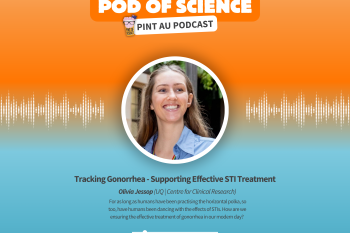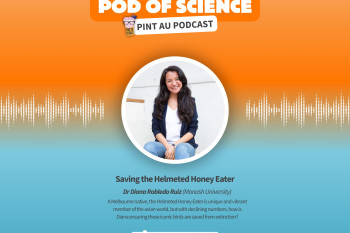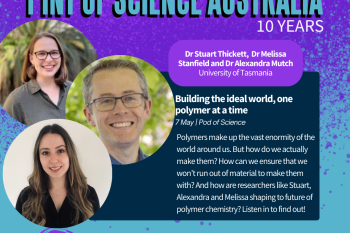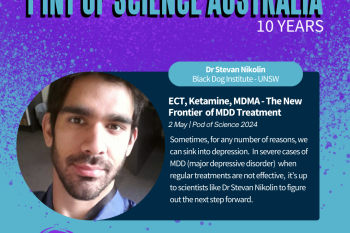© Pint of Science, 2025. All rights reserved.
How do you see matter that doesn't give off light? Adam Batten is using FRBs to help him out. What are FRBs? Why is Australia a great place to study them? Tune in to find out!
~~
Transcript
Camille Thomson: Welcome to another episode of Pod of Science. Today we're talking to Adam Batten. How are you today Adam?
Adam Batten: I'm good thanks. How are you?
Camille: I'm great, I'm really excited to hear about your work, so why don't you tell us in a few points what you do?
Adam: So I'm an astrophysicist, I just trying to understand basically the universe, and the way I do this is I use computer simulations. And so what I'm trying to do is trying to understand how galaxies have evolved till today. And the main area that I'm trying to understand about galaxies is how they interact with their environment. So, galaxies are a bunch of stars and gas and stuff like that, but outside of galaxies there's this tenuous kind of medium called intergalactic medium, which is the space between galaxies. And so this extra space between galaxies is actually super important 'cause galaxies kind of interact with their environments through like explosions. Material that was in galaxies, kind of ends up in the intergalactic medium due to like black holes and star formation, causing gas be kicked out of the galaxy and into this extra space and kind of changes the properties of this space. And similarly, this space is kind of a fuel of new gas that galaxies kind of creep onto themselves to form new stars. And so, I'm trying to understand how this intergalactic medium interacts with the galaxies.
Camille: So how did you come to be studying this intergalactic medium?
Adam: So I did my Masters at Macquarie in Sydney and I did a totally different field, I did something called common envelope, which is kind of interaction two binary stars. So two stars next to each other, and interacting. And then for my PhD I changed course completely and came to Swinburne where I was looking at trying to understand basic galaxies. And it kind of, the more we are trying to understand how galaxies evolve with time, the more my research kind of connected with the intergalactic medium. And so the more things were like, “Oh, this is a thing of the intergalactic medium we need to study”. Like I'm trying to understand how elements in galaxies get out of galaxies and that directly ties into the intergalactic medium. And then we need to understand how ionized gas around galaxies kind of evolves and that also then required intergalactic medium as well. My research kind of moved towards the intergalactic medium as my PhD went along. And sort of like it was, whatever I was doing, it just led towards intergalactic medium, and so that's why I'm studying this now. It just kept drawing me in. It's like more and more things we need to know. We need to understand the intergalactic medium.
Camille: That’s exciting though, that’s great. So what are some of the difficulties studying this? It’s obviously not physically here and you can do in the lab.
Adam: So the intergalactic medium is particularly difficult to study, so if you think about a normal optical telescope that you might see on like TV or whatever, it's usually looking in optical light. So light that we can see. That light is caused by electrons moving up and down atoms. So an electron moves up an atom, up and energy level of an atom and then down an energy level it will give off some light and that's what we can see with telescopes. However, the intergalactic medium is incredibly hot and incredibly low density, so it's about 1,000,000 degrees Celsius or Kelvin, whichever one you want to use. Million degrees really, really hot. It's all ionized gas, it's plasma. Secondly, it's really low density. It's about one atom per cubic meter, so you can imagine just your entire body just being one atom. That's how low density the intergalactic medium is. This has two problems. One, it's all plasma, which means there are no electrons moving up and down energy levels, which means there's hardly any light that we can see from the intergalactic medium. And also, because it's really low density, it doesn't cool down very often and even the atoms that are cool enough to give off light it's so low density that it's hard to find them, and so this has led to some significant challenges trying to understand the intergalactic medium, because it's almost invisible and it's very, very difficult to find. But yet it's really, really important, and so it's catch 22. It's like we can't find it, but it's really important. We don't know what to do. And that's what my research is trying to do.
Camille: So how do you look at it if you can’t use a normal optical telescope? What sort of tools do you use to “look” at this?
Adam: What we've been doing recently, so in 2007 there's this new type of astrophysical phenomena discovered, something called a fast radio burst, and what it is, it's in the name, It's cleverly named. It's a burst of radio emission that's really, really fast, and so these kind of really bright radio signals that last less than a millisecond. We don't know exactly what causes them. They're probably something related to a neutron star or really magnetized piece of neutrons. However, because they are radio light and they are really fast and narrow there really sensitive to the number of electrons they interact with. So you can imagine like your TV radio antenna. It's an antenna, and when radio signals interact with the antenna, it's picking up the electrons in the antenna, and then your TV's like measuring the movement of those electrons. So these radio bursts can act kind of like a sensor for a number of electrons. So what I was saying, the intergalactic medium is kind of, it’s all ionized, it's all gas, which is precisely what you want when you're trying to measure electrons, 'cause then all the electrons are there. If you can get a fast radio burst that shines through all the gas. Measuring number of electrons and when it gets to earth it has a precise count of how many electrons it interacted with along its way. And so we kind of use this to build up like what is the density of different lines of sight towards different fast radio bursts and try to understand where is the material in the universe. What is it doing and that sort of stuff.
Camille: That’s really cool. So do we have these antennas here in Australia or do you have to use ones from overseas? Or is it a combination of the two?
Adam: It's a combination of them, but the best ones I think personally are the ones actually in Australia, because they're kind of. Two areas of looking for FRB's or fast radio bursts. First one is just find as many of them as you can because it's a relatively new object. 2007, that’s 14 years ago. They’re kind of new compared to like how long we've known about galaxies. We just want to find as many as we can and then work out what they are. And the other camp is, well, we find them, but these bursts only go off once a lot of the time we never see them again and so trying to work out which galaxies they come from is also really really important. And so a lot of the telescopes in Australia like ASKAP, which is the telescope in Western Australia, and there's one in near Canberra called Molongolo. These telescopes are kind of working towards trying to find out what is the exact galaxy that this burst came from, and they're the ones that I am most interested in, because if you know the distance to these bursts, it's now a precise measure of what is the number of electrons you went through, 'cause if you don't know the distance to it, it could just be it just travel through more material and you don't know. And so the telescope in Australia are the ones leading the charge of trying to work out how the intergalactic medium is evolving using these fast radio bursts.
Camille: I’m glad we’re at the forefront.
Adam:Yes, particularly the next couple of years there's a SKA which is a telescope being built in kind of South Africa, and Australia. It’s also going to like help find heaps more fast radio bursts in the next coming decades, so Australia is at the forefront of these FRB searches.
Camille: So what are you hoping your research can lead to? What are you hoping the next step on your research will be?
Adam: So in my research, I'm trying to understand galaxies, right? One of the key things about galaxies is how they interact with this intergalactic medium and I'm trying to work out, “Can we use these fast radio bursts to determine how strong of explosions occur in these galaxies”. And so galaxies have supermassive black holes in the centre, they can have new stars forming. All of this, like emits a lot of energy and causing material to be kicked out of the galaxy and I want to know well if these galaxies are interacting with intergalactic medium, can we use these fast radio bursts to determine how strong this feedback strength is? How strong are these black holes? How strong is the star formation? That's basically one of my main goals is trying to understand, how strong is this feedback process. Basically a fundamental of my research is how does how does stuff get from galaxies into the intergalactic medium understand that and that's what I'm hoping fast radio bursts can help us understand. And hopefully in the next, you know, three months, I'll have a somewhat answer because I'm currently working on this at the moment and I have a paper out and hopefully three months. It has a decent guess it won't be the full conclusion, so it'll be a start.
Camille: A best guess is always good in Science. So what are some of the obstacles you’ve found in your work, either from switching focus or even just working on these FRBs and galaxies?
Adam: I guess the very start up there's a couple of different obstacles, right? So the very start of my PhD it was difficult to go from, in my Masters I was naming individual planets that exist I was naming like individual exo-planets and now it's like lumps of galaxies, all as 1 and sort of thing. So changing scale is kind of difficult, and all the all the physics involved is different, but it's similar, but it's different between galaxies and when you're studying individual stars, so that was kind of a big jump where a lot of terminology was different. That was kind of a difficult. That was more like a language technical problem. The main challenge that I've had to learn to deal with is dealing with huge amounts of data. So I was mentioned that I use simulations. These simulations are run on one of the biggest supercomputer in the world. So they’re huge. You can imagine like individual boxes of universe at any point times like here's a universe that was, a billion years ago and here's a universe that was half a billion years ago. You can have like a bunch of different universes and you compare them. And each of these universes, like half a terabyte or more. And so when I have like hundreds of them. It's a huge amount of storage and so dealing with lots of large amounts of data in efficient ways and not, you know, taking up all of the time on our supercomputer at Swinburne is difficult. Trying to learn better coding practices and understand and use big data efficiently is was the biggest problem I found like in my PhD. Just imagine trying so there's a three month period where I had to download like you know. 150 TB or something of data and it’s difficult.
Camille: You aren’t going to keep that in a hard drive in your pocket are you?
Adam: Yeah, exactly.
Camille: I think data is becoming the issue with a lot of people getting more information in and then they have to store it and process it.
Adam: Exactly.
Camille: At least you’ve got, I suppose at least there’s access to one here in Australia
Adam: I don't know if I could have done my PhD without the access to the supercomputer at Swinburne.
Camille: I can’t even operate the one that sits on my desk so I don’t envy you at all.
Camille: So I wanted to ask you a slightly bigger question in what you think is the greatest challenge for science as a whole right now?
Adam: So there's a couple of different issues that I can see. First was kind of like dealing with the large scale like cooperation with people around the world and trying to do it in a way that is, you know, like ethical and stuff like that. Like I was just talking about using supercomputing and supercomputing, uses a lot of energy and resources and is not particularly good for the environment. And so I think a big challenge of science is going forward is like, even though we want to research things, doing so may not be better for everyone in terms of the environment or stuff like that, and I think that's a challenge that we might have to deal with. Like another example in astronomy is people may have heard about telescopes in Hawaii, and astronomers like putting telescopes on top of Mauna Kea in Hawaii. But that is also a sacred site to the native population. And so even though it's good for us to put a telescope there, it isn't necessarily good for the native population and everyone else. And so that's kind of questions we have to deal with it like is it is some areas of science worth it to, but to disregard other parts of humanity, and I think that's important questions that will have to talk about in the next 5-10 years Like is it worth it to do this or not?
Camille: Yeah sure. It’s not just sustainability but is there a cultural issue or is there another issue and someone else is going to not do well.
Adam: Yeah. Yeah. It's like we can't just say this is for science and then get away with it. We have to think about carefully. It's like is this the appropriate thing to be doing?
Camille: So kind of my last interesting, curious question is why you chose to be part of the Pint of Science Festival?
Adam: So I choose to be, so I was part of the Pint of Science Festival last year and that was my first year. I found it quite fun to talk about, like my research on Twitter. And then I was also on of the panels as well. It was excellent ’cause I've always enjoyed talking about my research to to people and just explaining things and astronomy is particularly good at this kind of like it's a bit of a. A wondrous kind of science you kind of imagine things. And so I've always kind of just love talking about what I do and Pint of Science is basically that, but would be over a beer in a pub instead. It's 'cause so I basically just like sharing all my work with as many people that would like to listen as possible.
Camille: That’s always a good reason. Did you have any contact with the festival before you were a presenter?
Adam: I have had contact with a couple of people I know, a couple people that work with the festival little bit there, they volunteered for the festival and they always remind me when things are coming up and so I was like Oh yeah, that's coming up in the next month. I should register to give a talk or talk about my stuff and stuff like that, yeah? So couple of my friends also participated as well.
Camille: Excellent! I love that our volunteers are dragging people in. It’s great.
Camille: Yeah.
Camille: And very lovely to have had you on a Pod of Science as part of our podcast offering.
Adam: Thank you.
Camille: So looking forward to giving you the chance to do it over a beer perhaps next year when we’re back in the venues.
Adam: That would be great.
Camille: For now, good luck with the large data sets.
Adam: Thank you.
Camille: You have been listening to a Pod of Science. Catch up on all of our episodes on SoundCloud and Spotify. Don't forget to follow our social media on Facebook, Twitter, and Instagram to hear everything about your Pint of Science Festival. And consider jumping on our website pintofscience.com.au and donating to support your festival.




